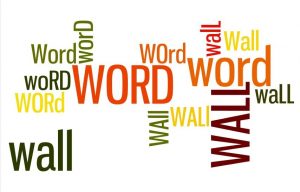Transforming My Classroom, One Bite at a Time
 The following is a reflection from Ceci Johnson! Great reflection Ms. Johnson!
The following is a reflection from Ceci Johnson! Great reflection Ms. Johnson!
As a first year teacher, I felt like I was drowning, occasionally able to tread water just long enough to catch my breath again. But I survived and came back roaring and ready for round two. Mid-way through the first nine weeks, I was able to spend a day visiting classrooms of my coworkers to observe and reflect on my own teaching strategies. As a lifetime learner, I greatly appreciated this opportunity to reflect and redirect.
One of my strengths as a teacher is questioning. It is very rare that you will actually observe me answering a question directly, most times, I answer a question with a question. I do not want to give the students the information they seek, rather allow the students to discover the information. I lead them in their discovery by asking the probing questions necessary. Many of my students do not like this, it frustrates them when I do not provide a direct answer. But through the struggle, frustration, and challenge, the real learning occurs. A peer I observed has the same thought process on questioning, however she is much more consistent with the not-answering part. Occasionally I find myself giving in too soon, instead of allowing the appropriate think-time for the students to think through their struggle. This is one aspect of my teaching I know I can grow in, allowing adequate think-time.
Many classrooms had a word-wall posted. Each was unique to the style and personality of the teacher in the room. This is most definitely a HUGE growing area for me. I started a word-wall last year, however I only added about six words to this wall, which is not near enough. Time became my mortal enemy when it came to my word-wall. I know, I know, that every teacher is juggling a huge plate, I am not trying to use lack of time as my excuse. But at the end of the day, if it came down to preparing materials for tomorrow’s class or adding to the word-wall, preparing materials came first. In my mind, word-walls were(are) a piece of art, beautifully written and decorated. Much to my surprise, they can actually be basic, just words on a wall. One teacher had the words grouped by category, for example, “Transformations” would have the terms “dilation, translation, reflection, rotation” under it. Students need to be exposed to new vocabulary over thirty times in order for them to feel comfortable using the words in everyday life. In my mind, some of the math words require a picture to go along with it for clarification, for instance acute versus obtuse, a pictorial representation would help greatly for a student learning to differentiate the two. My goal is to find a word-wall method that works for me, efficient yet effective.
 My absolute favorite part of a class I visited was the “Dead Word-Wall”. I love this idea because it encourages students to replace their basic vocabulary with new, grade-level appropriate vocabulary. This is something I will definitely implement in my room, everytime I hear the word “times” or “minus” instead of multiply or subtract, I cringe. The “Dead Word-Wall” will reduce the use of this vocabulary and eventually eliminate the problem altogether. My plan, is that when a student uses one of the dead words, I will point to that spot on the wall and ask them to find a better word choice.
My absolute favorite part of a class I visited was the “Dead Word-Wall”. I love this idea because it encourages students to replace their basic vocabulary with new, grade-level appropriate vocabulary. This is something I will definitely implement in my room, everytime I hear the word “times” or “minus” instead of multiply or subtract, I cringe. The “Dead Word-Wall” will reduce the use of this vocabulary and eventually eliminate the problem altogether. My plan, is that when a student uses one of the dead words, I will point to that spot on the wall and ask them to find a better word choice.
A focus that I have continued in my class from last year is writing in mathematics. It is important for students to be able to defend their mathematical reasoning. However, as with many things, time has been my enemy with implementing this to fidelity. During my observations I had an ‘ah-ha’ moment that showed me a time-friendly method which will once again facilitate writing in my mathematics classes, an exit – slip requiring writing. This is something I can quickly look over, highlight terminology that needs replacing, errors in math, etc. Then the students will revamp their explanation the next day and the day after until perfection is achieved. This will allow students to once again acclimate themselves to writing in math while allowing them to experience success with writing, which is vital for students tackling the daunting task of writing in mathematics. Once all students have mastered this, I will implement a small weekly assignment, requiring students to defend his/her reasoning which can be completed during their individual work time as I am pulling small groups.
After much reflection, I have decided my focus for this nine weeks will be developing a time-efficient method to creating an effective word-wall. This is something I will have to get in the habit of doing, take fifteen minutes each day and dedicate that to hanging words on the walls for my students, possibly utilize my TA’s to help me be successful with this. I greatly enjoyed and learned a lot during my observation rotations. Now it is my turn, to take what I have learned and transform my classroom, one bite at a time.